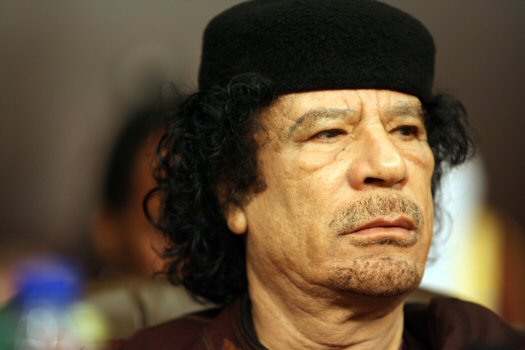 Kareem Fahim writes for The New York Times:
Kareem Fahim writes for The New York Times:
After 42 years of absolute power in Libya, Col. Muammar el-Qaddafi spent his last days hovering between defiance and delusion, surviving on rice and pasta his guards scrounged from the emptied civilian houses he moved between every few days, according to a senior security official captured with him.
Under siege by the former rebels for weeks, Colonel Qaddafi grew impatient with life on the run in the city of Surt, said the official, Mansour Dhao Ibrahim, the leader of the feared People’s Guard, a network of loyalists, volunteers and informants. “He would say: ‘Why is there no electricity? Why is there no water?’ ”
Mr. Dhao, who stayed close to Colonel Qaddafi throughout the siege, said that he and other aides repeatedly counseled the colonel to leave power or the country, but that the colonel and one of his sons, Muatassim, would not even consider the option.
Still, though some of the colonel’s supporters portrayed him as bellicose to the end and armed at the front lines, he actually did not take part in the fighting, Mr. Dhao said, instead preferring to read or make calls on his satellite phone. “I’m sure not a single shot was fired,” he said.
As Libya’s interim leaders prepared Saturday to formally start the transition to an elected government and set a timeline for national elections in 2012, sweeping away Colonel Qaddafi’s dictatorship, they faced the certainty that even in death the colonel had hurt them. The battle for Surt, Colonel Qaddafi’s birthplace, was prolonged for months by the presence of the fiercely loyal cadre he kept with him, delaying the end of a war most Libyans had hoped would be over with the fall of Tripoli in August.
Mr. Dhao’s comments, in an interview on Saturday at the military intelligence headquarters in Misurata, came as the final details of the colonel’s death, at the hands of the fighters who had captured him, were still being debated.
Residents of Misurata spent a third day viewing the bodies of Colonel Qaddafi and his son at a meat locker in a local shopping mall. Officials with the interim government have said that they will conduct an autopsy on the bodies and investigate allegations that the two men may have been killed while in custody, though local security officials have said they see no need for such an inquiry.
Mr. Dhao, who is said to be a cousin of Colonel Qaddafi, became a trusted member of his inner circle. As head of the People’s Guard, he presided over a force accused of playing a central role in the violent crackdowns on protesters during the uprising, including firing on unarmed demonstrators in Tripoli’s Tajura neighborhood. The guard’s volunteer members harassed residents at checkpoints throughout the city. Mr. Dhao was believed to have kept weapons and detainees at his farm, according to Salah Marghani of the Libyan Human Rights Group.
In a separate interview with Human Rights Watch, Mr. Dhao denied that he had ordered any violence.
On Saturday, he spoke in a large conference room that served as his cell, wearing a blanket on his legs and a blue shirt, maybe an electric company uniform, inscribed with the word “power.”
A few guards were present, but they spoke only among themselves. He said his captors had treated him well and had sent doctors to tend to injuries he sustained before his capture, including shrapnel wounds under his eye, and on his back and left arm.
Many of his statements appeared to be self-serving; he said, for instance, that he and others had repeatedly tried to convince Colonel Qaddafi that the revolutionaries were not rats and mercenaries, as the colonel was fond of saying, but ordinary people.
“He knew that these were Libyans who were revolting,” he said. Other times, he seemed full of regret, explaining his failure to surrender or escape as his way of fulfilling “a moral obligation to stay” with the colonel before adding, “My courage failed me.”